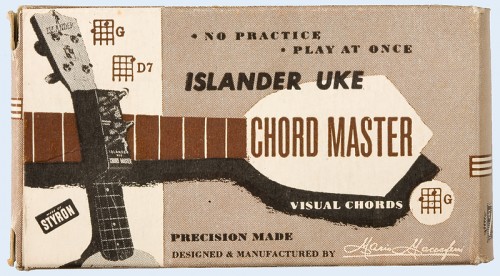Ukulele Heroes (2)
By:
November 1, 2010
It’s hard today to imagine the authority and fame that Arthur Godfrey amassed in the early days of television. Throughout the 1950s, his 90-minute daily show and two weekly prime-time series had him appearing in the new medium as many as nine hours per week. His output included quiz shows, interviews, commentary, talent shows, and variety — an embrace of television that was powerful and poignant, in a curious way: a previous technological transformation had destroyed the livelihood of his father, a journalist who had written about carriage horses.
Instrumental to Arthur Godfrey’s appeal as well was the ukulele (which — in an uncharacteristically pedantic touch, he pronounced “oo-kulele” in mock-authentic Hawaiian fashion). It was his ship of state, an ironsides quatschmobile into which to pour sentiment and sweetness. (and other fluids as well — including soup and Lipton’s tea, as Steve Allen did with Godfrey’s uke on a 1953 installment of Talent Scouts— a trick Allen would not have tried with, say, Pablo Casals’ cello.) Godfrey typically played a baritone ukulele, which is larger than the familiar soprano size — more authoritative, more masculine, perhaps. But safe and sentimental, and somehow the opposite of folksy, nonetheless.
Godfrey helped touch off a ukulele renascence in 1950, hosting a short-run series on CBS in which he offered ukulele lessons — and hawked the “Islander,” a plastic ukulele manufactured by guitar designer Marco Maccaferri, of which nine million units ultimately would be sold.

Eventually, however, Godfrey’s quatsch-cruise began to founder. Although his loving audience didn’t know it, he was as imperious behind the scenes as he was affable and witty onscreen. In 1953, he fired costar Julius LaRosa on the air, announcing the surprised singer’s departure. Although Godfrey would later cite insubordination, it’s more likely that LaRosa’s own rising fame was an issue for the high-flying host. In the ensuing flap, audiences learned that the gap between the harmless, genial uke strummer and the media mogul was an unbridgeable one. Godfrey continued to appear in television, his gigs were sporadic cameos, and he never reclaimed the Faustian power quatsch had once granted him. One is left to wonder: had Godfrey based his empire of the airways on a career as a crooner, rather than relying on the ukulele as a prop, would audiences have forgiven him his hauteur?
